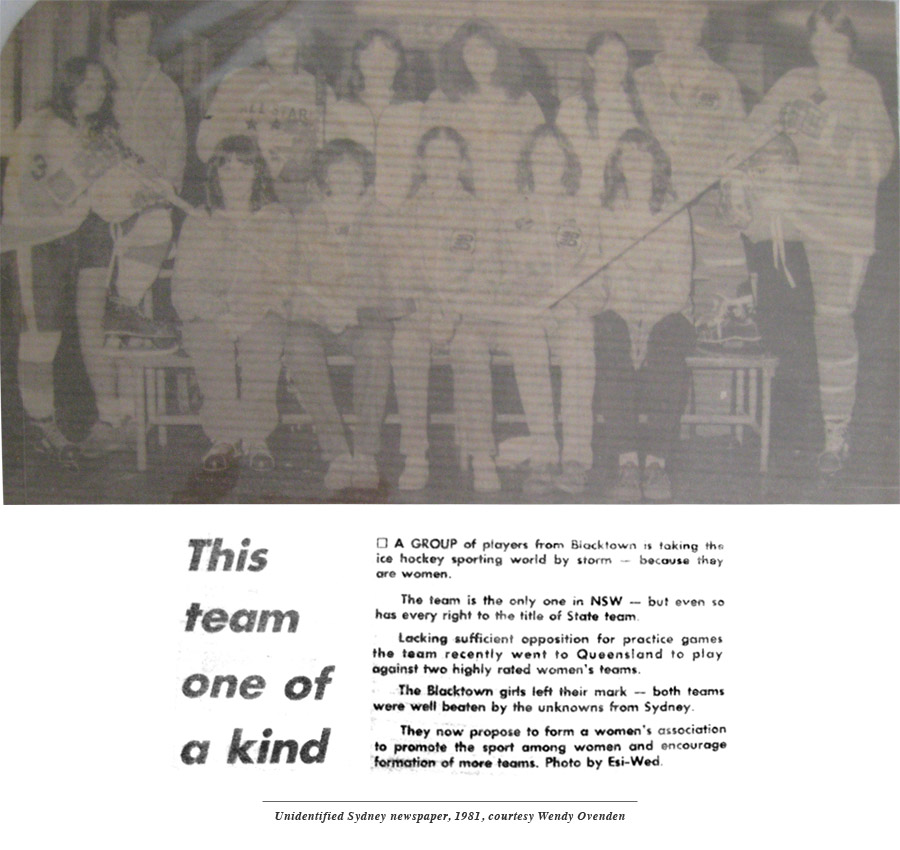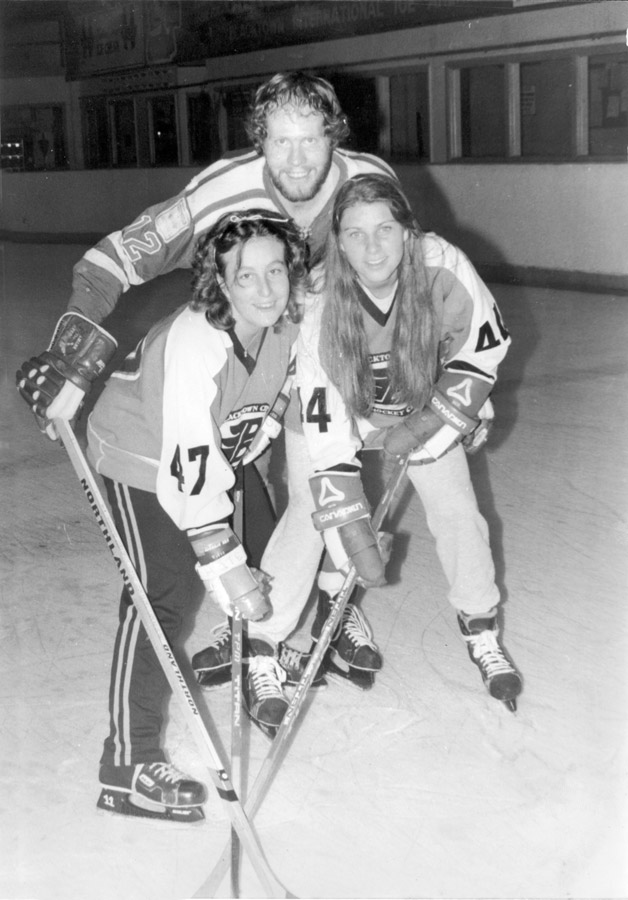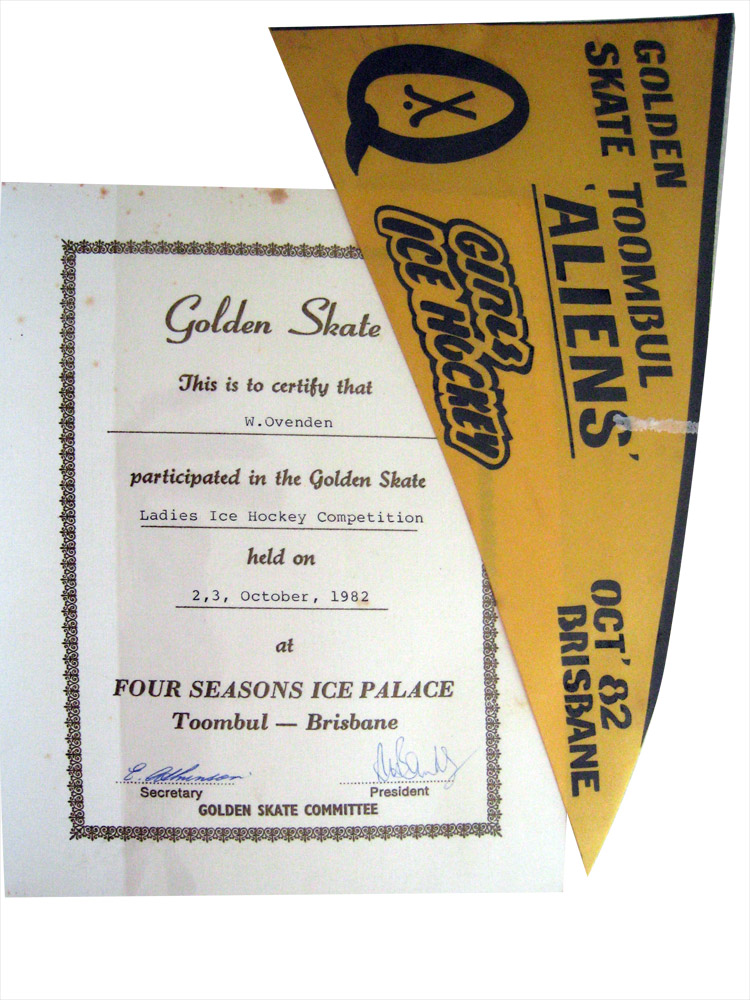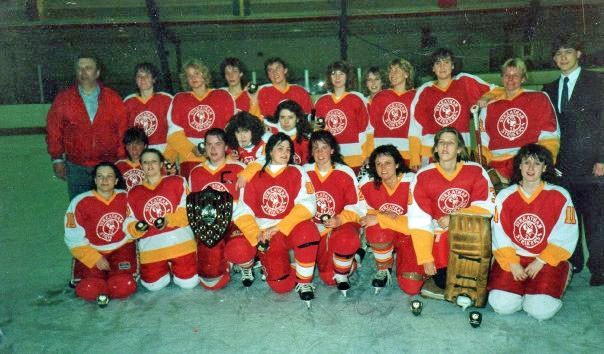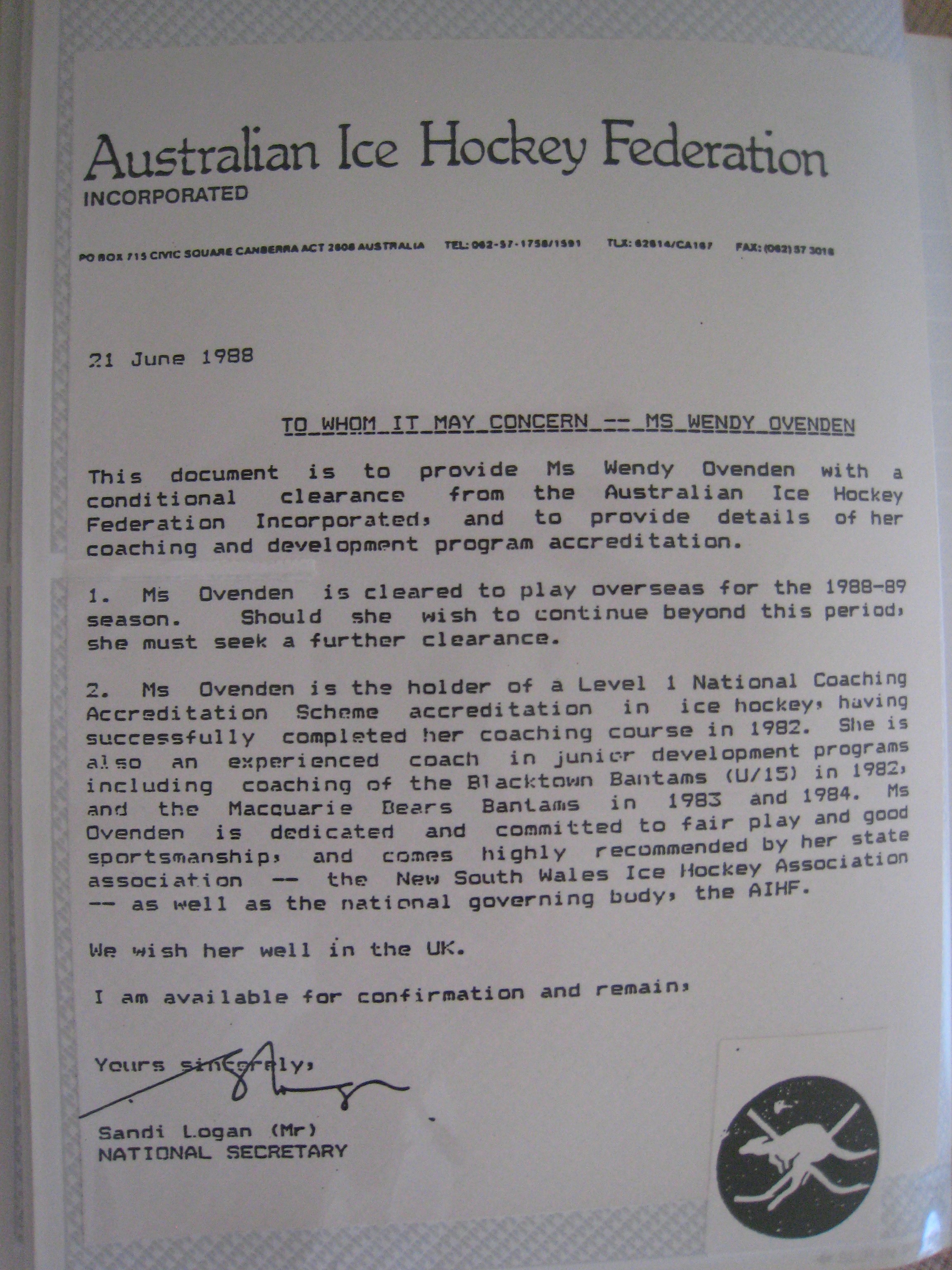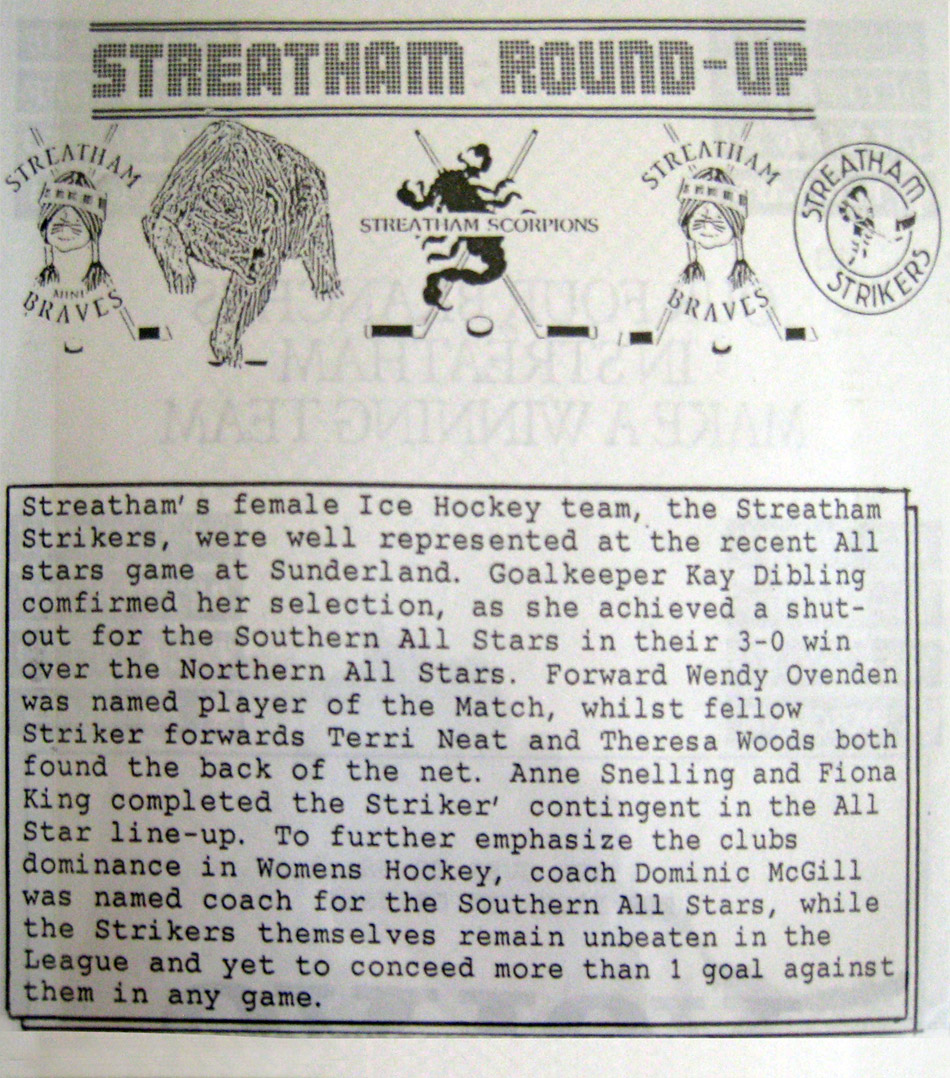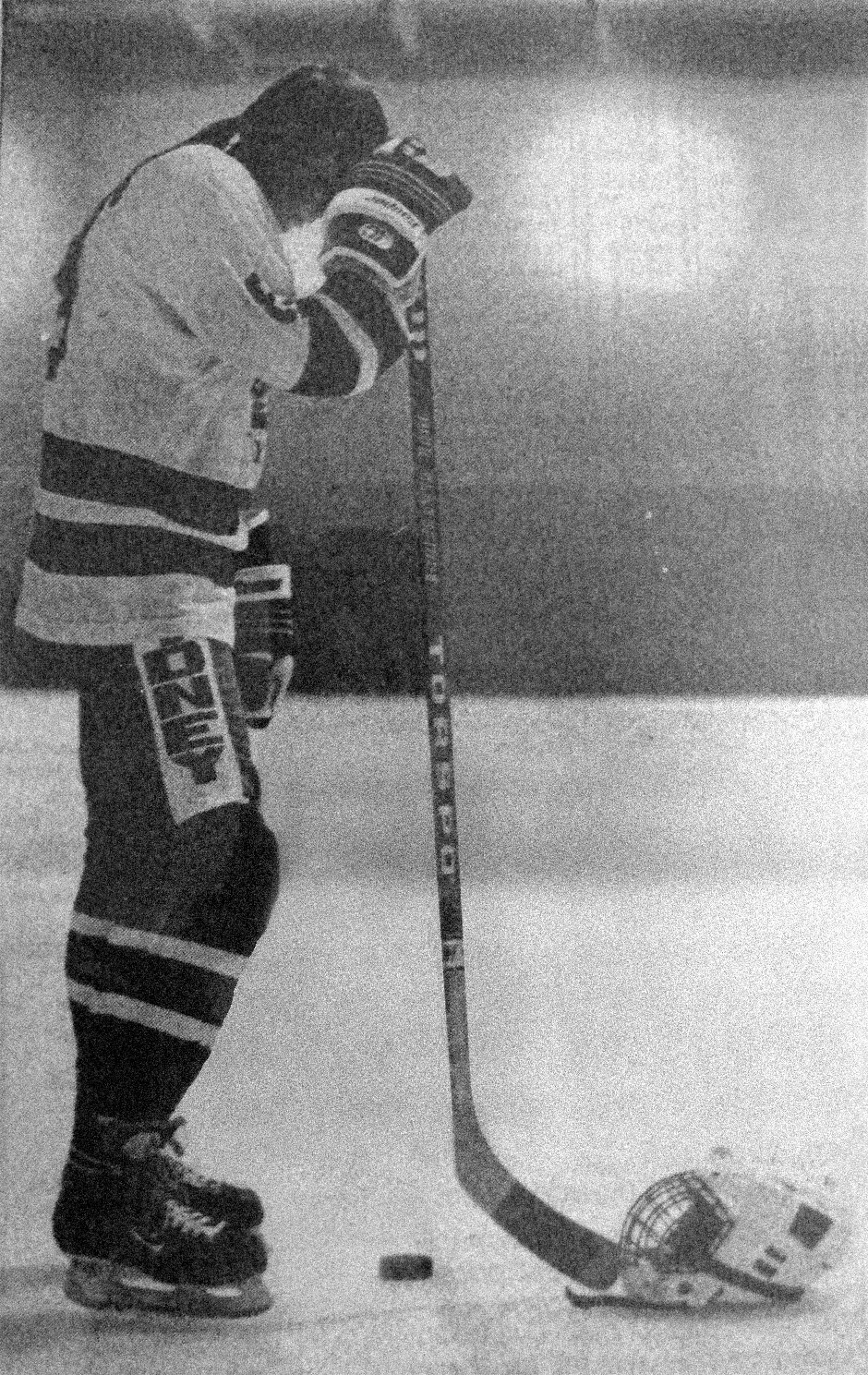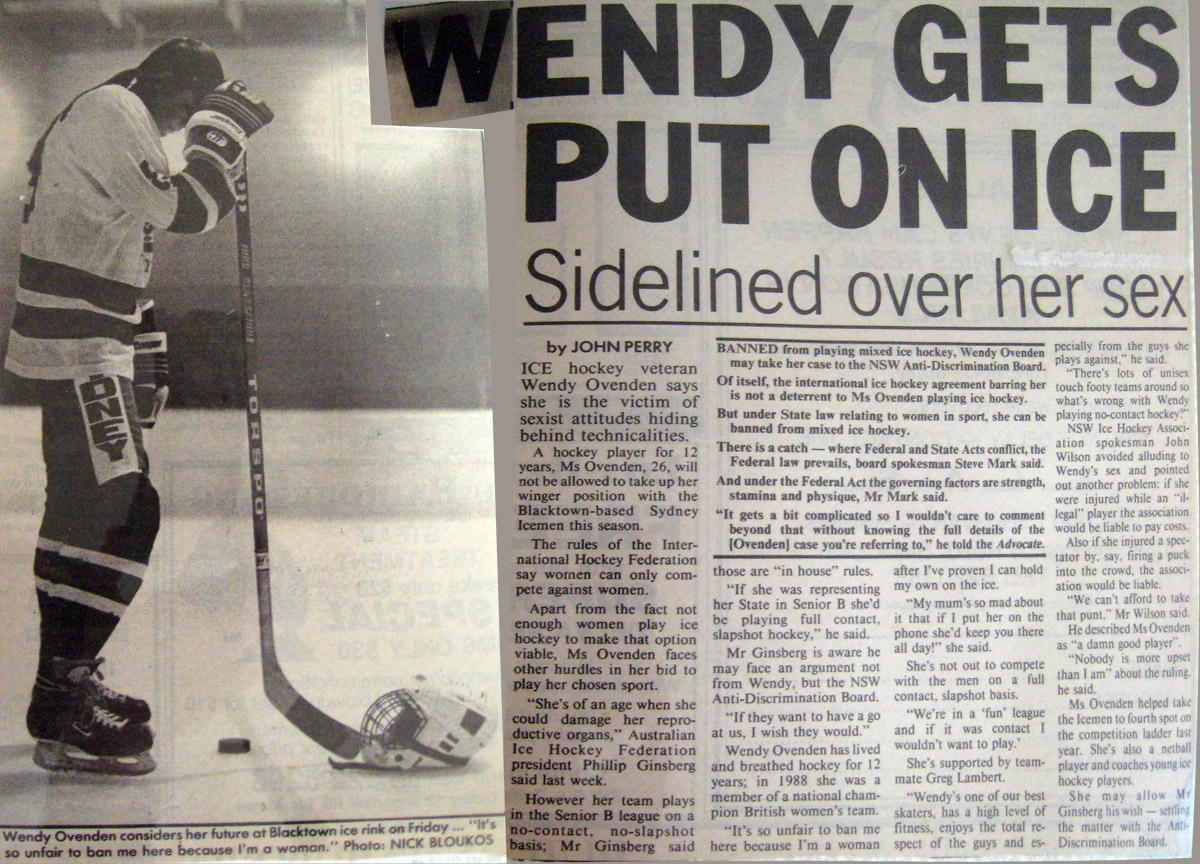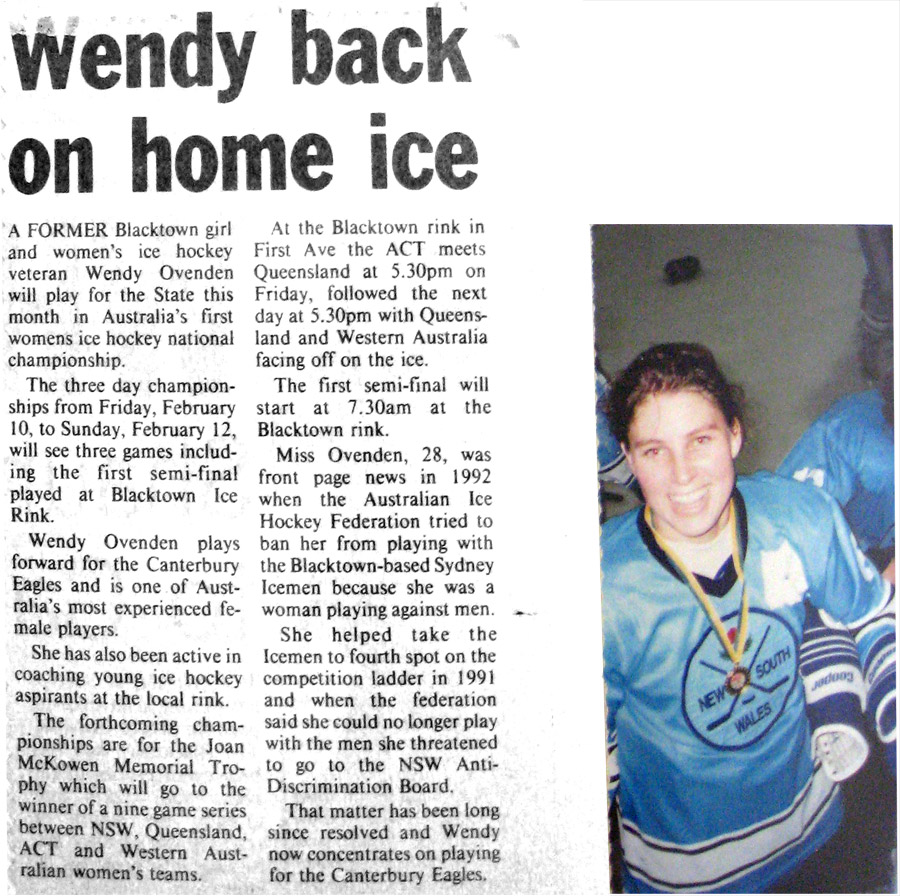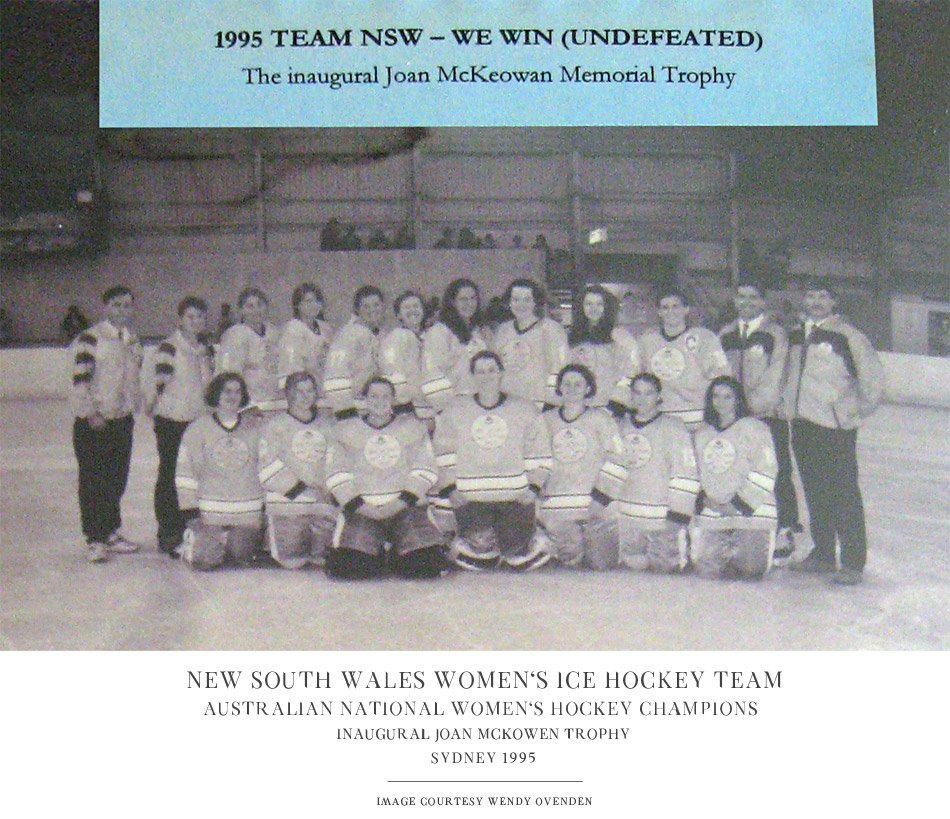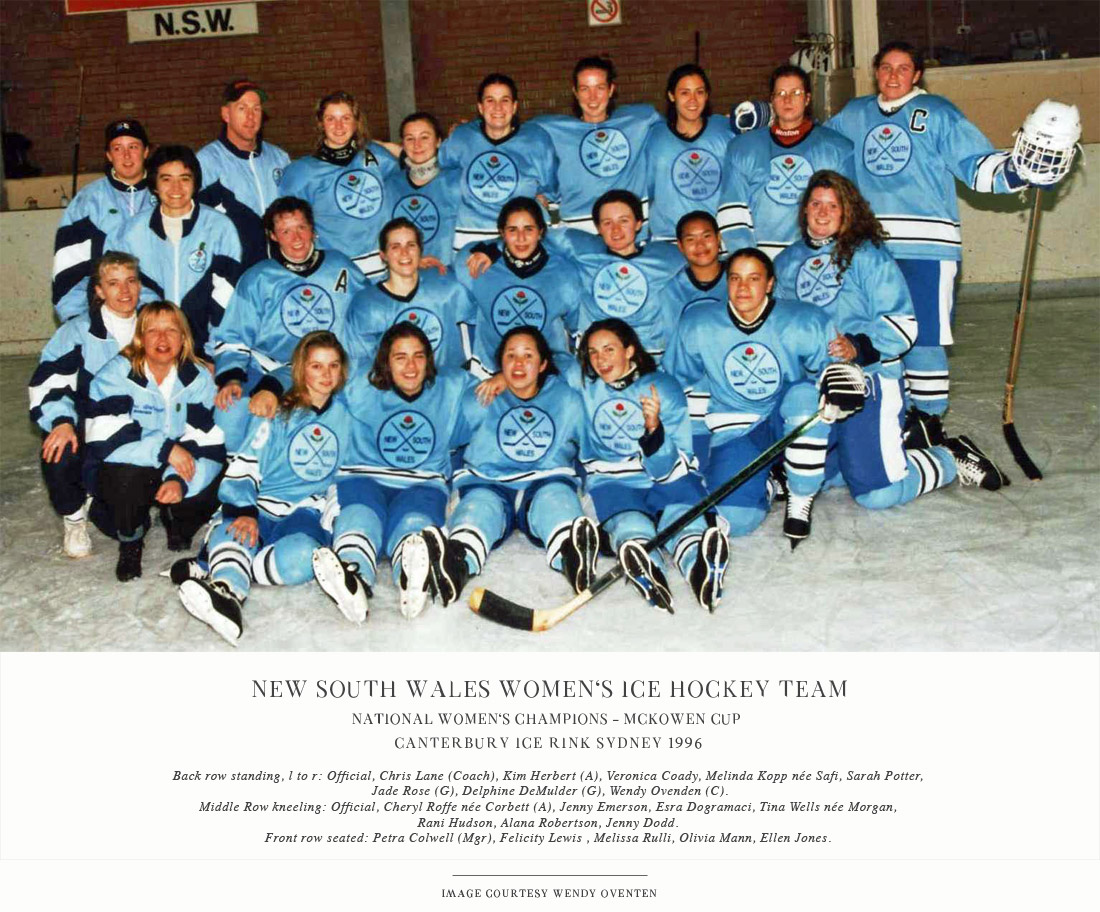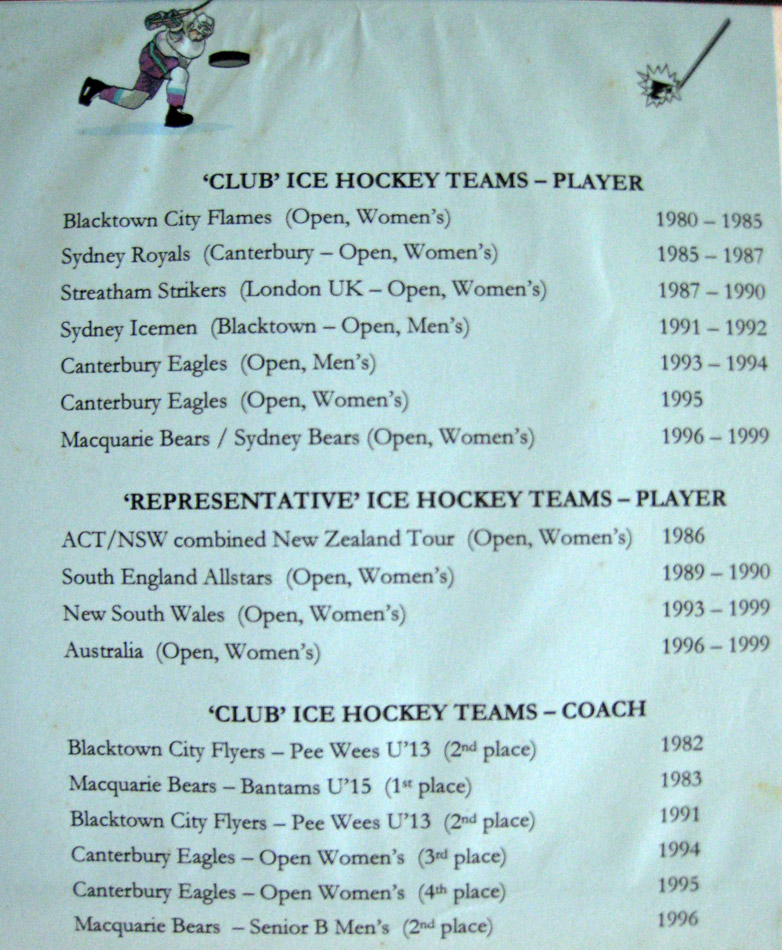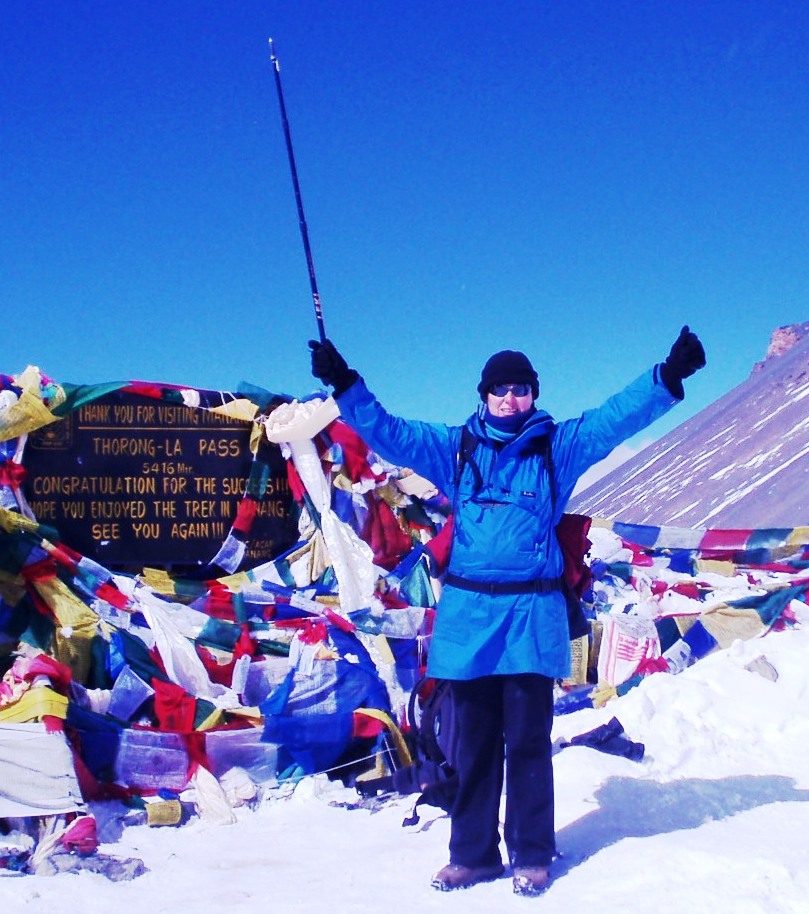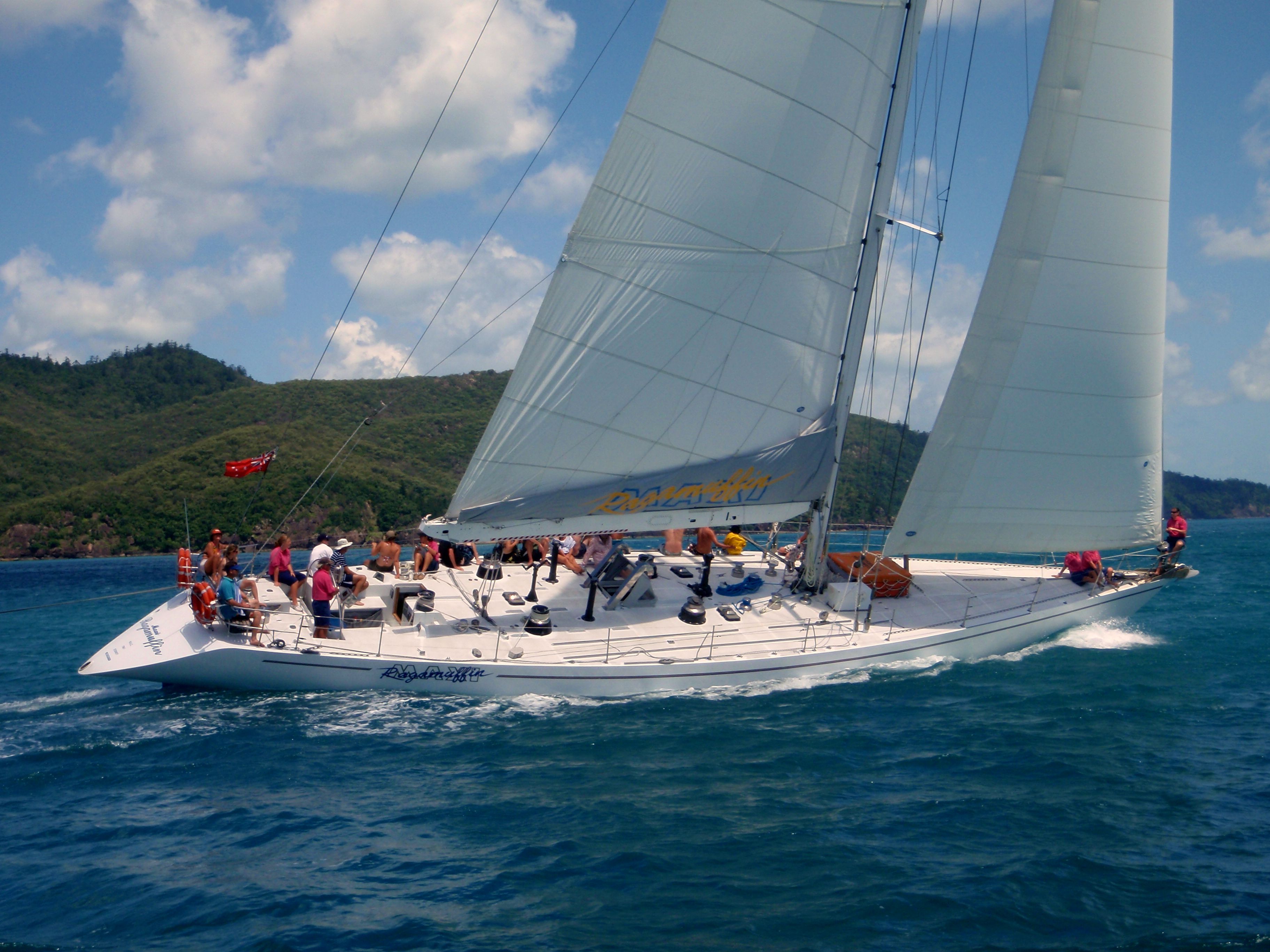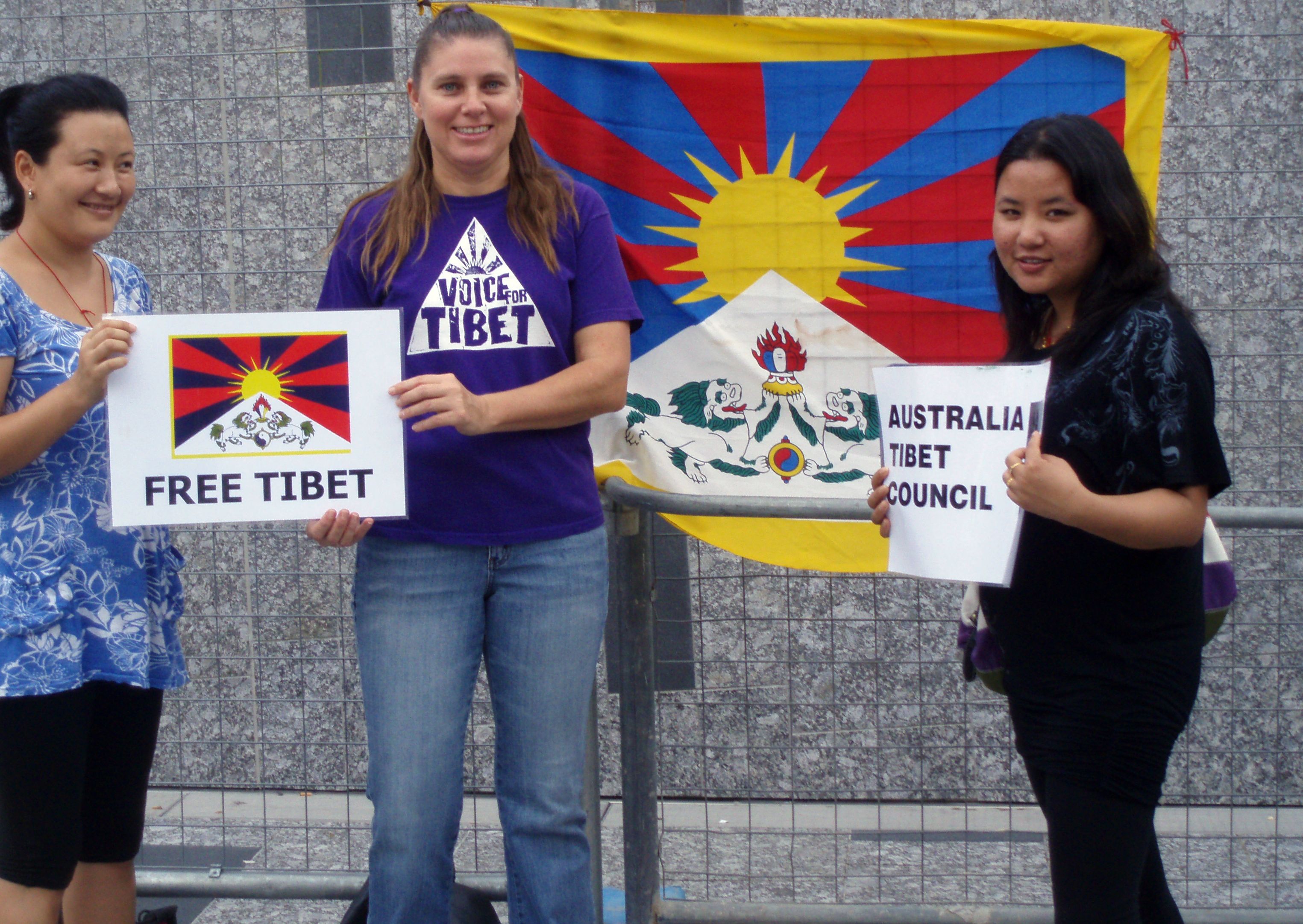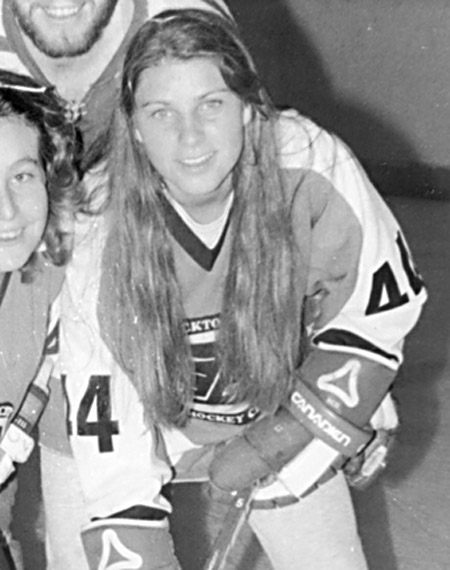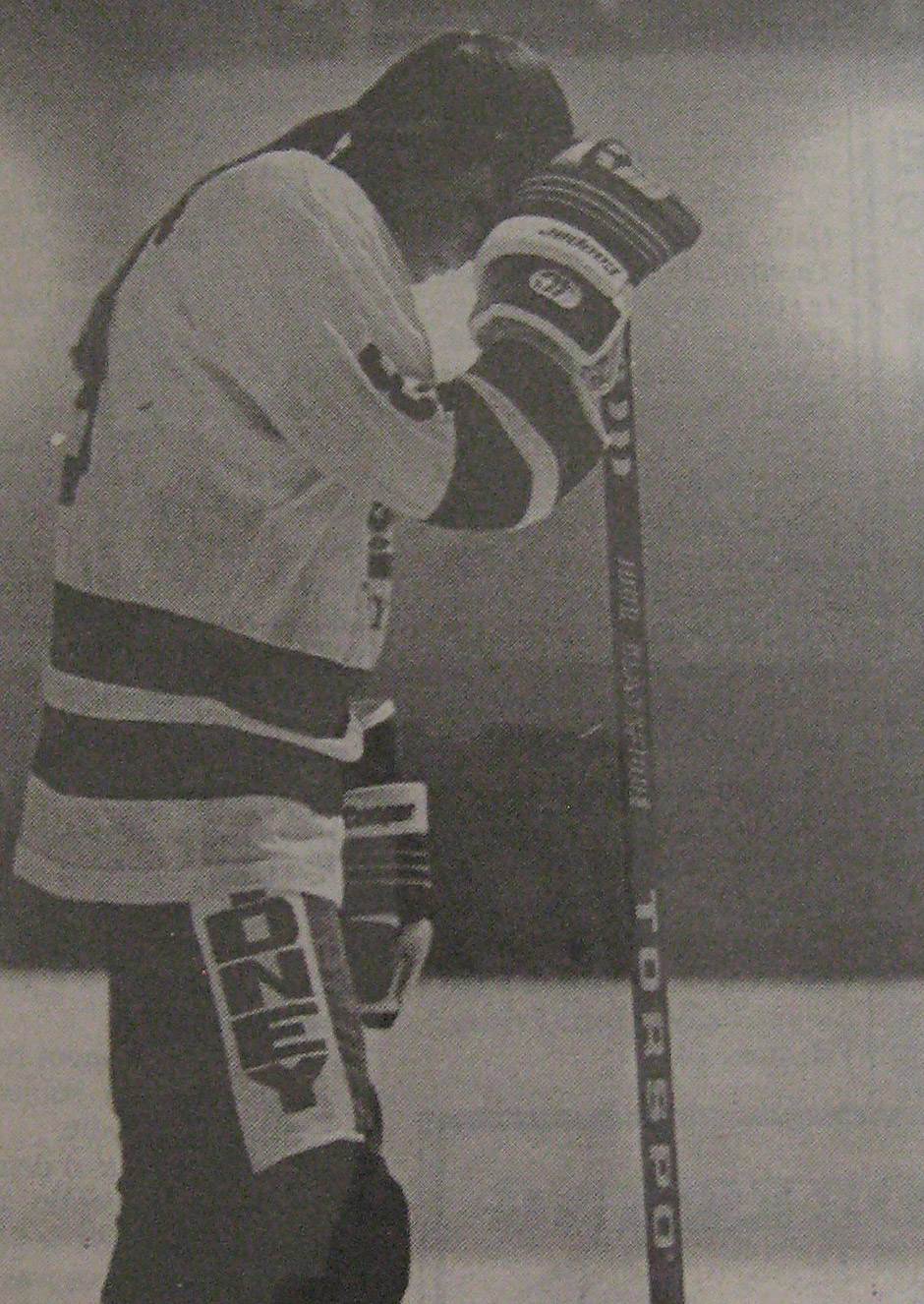
Ovenden considers her future at Blacktown Ice Rink in 1992. Photo by Nick Bloukos.
Man Advantage
Wendy Ovenden and the higher goal
It was a good feeling knowing that from a first-season beginners perspective, as you would expect from any coach, that when the coach had something to say, it was always something positive no matter what. Wendy was that kind of person who demonstrated this stand-out quality, along with patience — you know what growing teenagers can be like, at every opportunity. These are qualities that some coaches do not even possess today. So many people respect Wendy for all the years she has been involved in the sport, and I included. Thanks a bunch, Wendy.
— Carl Di Piazza, former player with the Australian National Men's Team, 2016.
I feel so humbled and privileged that so many people have helped women's ice hockey and joined me on my hockey journey. So many people gave up their own time and money out of the goodness of their own hearts — it is just so humbling. I could name hundreds, probably thousands, of people from every corner of the globe and every walk of life who were such a positive part of this journey on and off the ice — many of these people are still in my life and remain very close friends to this day. Hockey is such a special sport and it creates very special friendships.
Meeting the sledge hockey guys put everything into perspective.
The few weeks spent in Sikkim with Kesang and his family were more memorable to me than any hockey game could ever be. Just knowing how much my small amount of money every year helped his family is what life is all about — the way his mother thanked me bought me to tears — I still get tingles now thinking about it. Without question, the best thing I have ever done in my life.
— Wendy Ovenden, foundation player with the Australian National Women's Team, 2016.
A FLOCK OF FLAMINGOS TOOK OFF, flashing orange and black and stripping the blue water white as their legs lifted clear. Land's End. At last a faraway place seldom visited, like the land where the Jumblies live. About the size of New South Wales and Victoria — but with fewer people per square kilometre than Western Sahara — Patagonia remains remote, even a century or more after Europeans first settled in. Although stories of the bandoleros norteamericanos abound all along the Southern Andes, they are not enough to dissuade her from trekking the circuit trail circling the Paine massifat in the Torres del Paine National Park. Elected as the fifth-most beautiful place in the world by National Geographic, the feeling of remoteness and vulnerability is nonetheless palpable, the winds whipping it into a fury, into a cacophony of angels, into a fanfare for the granite towers that erupt from its wide rolling grassland like a primordial Manhattan.
Driving deeper into the endless interplay of light and shade, the peaks dance before her like Fred and Ginger, one stepping forward, one shrinking back, while dazzling blue lakes add fantasy to the compulsive beauty of it all. From the shore of Lago Grey in front of her windows, in the small hosteria where she has stopped for the night, the lake stretches due north to the base of a seven thousand-year-old glacier from which slabs of blue ice have calved and drifted down the lake toward her. They lie there beached and abandoned, haunting metaphors of the ice she too has deserted on the far side of the globe.
Wendy Ovenden was born in Sydney Australia on August 11th 1965. Her father, Brian, a mad St George Dragons footy fan, took her to rugby league games from a very young age and at some point she discovered second cousins playing for Penrith. Her passion for the mighty Panthers rose exponentially throughout the seventies, peaking in three seasons with the Penrith Pantherettes cheerleaders, 1977 to '79. Still "a one-eyed, die-hard fan today", she survived most of her teens on a diet of footy and fiercely-competitive club and representative netball. And that might have been that, but for her father's tales of younger days and an unconventional pastime at the old Glaciarium.
She began skating in the general sessions at Homebush Ice Rink in 1979, then attended the summer ice hockey training camp at Canterbury Ice Rink. At fourteen, she and Annette Davis were the first Sydney girls to play when women's ice hockey resumed there for the first time since the 1920s. They were supported and encouraged by the Canterbury United players — among them Kevin Price, Noel Taylor, Mark 'Stevo' Stephenson — and also Jack Heggie, president of the state association, "a wonderful man who helped us in the very early-1980s". The days of turning out for ice hockey in her 'netty skirt' were now numbered and she gave up representative netball, playing both club netball and ice hockey, until there was only hockey.
In 1980, she joined the hockey program at the new Blacktown rink; began scrimmaging with the Red Devils and Blue Angels; and traveled the seventeen hours up to Toombul on the old red rattler, Brisbane Limited, to play the Queensland girls. In 1981 she was playing in both cities and the next year she enrolled in the coaching program run by Canadian, Mark Sadgrove, where she qualified as a Level 1 coach. She joined the ACT's Mumma Bears women's team on their New Zealand tour, winning all seven games.
In 1982, she continued to coach at Blacktown where Chris Pett and Steve Green coached the women's team. "Both these men were fantastic for women in hockey for many years". She played with the Blacktown City Flames from 1980 to 1985, her first seasons of regular organised competition, and also in the Bantam league with boys. She was still only sixteen so her mother, Marguerite, drove her to games all over Sydney along with half the boys teams she coached. "What a champion!" A constant stream of two or three boys stayed at her place the whole day every Sunday. They were fed and chauffeured to games and then home, wherever they lived, without complaint.
As the opening of the Macquarie rink loomed large in 1982, Ronald Mann asked her to coach its Bantam team. Mann had been a nourishing source of encouragement and this just happened to be the year Canada held its first national championship for women’s ice hockey. She had coached Rad Benicky in the Blacktown Bantams and they and a few others transferred to Macquarie, a move that turned out great. She also trained there for a season or two with Adam McGuinness, the Macquarie Bears UK arrival and coach of the Macquarie Midgets, who became an Australian citizen and national team player. She competed in the Golden Skate Ladies Ice Hockey Competition at the Four Season Ice Palace at Toombul in Brisbane in October 1982, and continued as captain of the women's team at Canterbury when the Flames became the Sydney Royals from 1985 until 1987, coached by Steve Green.
In the years 1987 to 1990, Ovenden played with the Streatham Strikers in the Women's English League, coached by Dominic McGill. The first season in Britain was contact hockey, the second was left to teams to decide, and by the third there was no contact at all. She had never ridden the bench in Australia but she was warming the Strikers bench for most of her first two games. Then, in the township of Solihull in the West Midlands, in amongst big, tough opponents and a bench clearance, she produced her first goal for the Strikers and the second highlight of her career. "Wow!!!" she exclaims, "Welcome to the big league!" The ref gave her the game puck.
Deep in a Golden Era of British hockey, she was joined in the many new rinks by the Mumma Bears' Julie Elliott for two seasons. Other teams in the UK league had Canadian, Finn and American imports, but Streatham had two Aussies! During her time there, the Strikers were British women's champions in 1987-88 and twice runners-up. She also represented South England and was Player of the Match in the North vs South England All-Stars in which her team dominated. "Streatham Strikers were an amazing bunch of women," says Ovenden. "We had such a special bond over our years playing, and now our years not playing — many of us are still friends today". Strikers' coach McGill considered her more than just another player, "A true leader who became a key figure in the British game".
On her return home to Australia in 1991, she played wing with the Sydney Icemen in a non-contact league at Canterbury and coached the Blacktown Pee Wees. She helped take the Icemen to fourth spot in the standings, but in 1992, at age 26, she was front page news when the national association banned her from playing because she was a woman playing against men. Almost ten years earlier, when there had similarly been no league for women, sixteen year-old goalie, Karen Somerville, had faced a life ban from her state association for having played in a men's team in an age match. Phillip Ginsberg, president of the national association, said of Ovenden, "She's of an age when she could damage her reproductive organs". However, that did little or nothing to explain the ruling. Her Icemen team played no-contact, no-slapshot hockey.
"We're in a fun league and if it was contact I wouldn't want to play," said Ovenden at the time. She considered going to the NSW Anti-Discrimination Board, prompting Ginsberg to say "If they want to have a go at us, I wish they would". She was most welcome to "go off and form a national women's team if she wants," but not enough women in Sydney played ice hockey to form a senior team, let alone a women's league.
A few months later, after the second Women's Worlds in Finland, the International Olympic Committee voted to include women's hockey in future Winter Games. Ovenden lost a season of competitive hockey, but eventually resumed playing with the Canterbury Eagles men's team (1993, '94). Today, she considers "it all a bit of a storm in a teacup". The Mighty Ducks movie was released in the US in late-1992 and in Australia in April the following year.
More exposure meant a lot more interest in the sport and recruits. Plus, "every four years we always had an influx of players due to the winter Olympics".
In 1993, the Warringah Wild Cats were formed by Chris Pett with Jenny Dodd as captain, "one of my best friends still today." The Wild Cats were Narrabeen's first women's team, and meanwhile at Canterbury Ellen Jones was playing Pee Wee; Kim Herbert and Tina Morgan had played a little hockey with the boys; Melissa Rulli and Melinda Kopp (Safi) were in their teens.
Ovenden became player-coach of Canterbury Eagles at the dawn of a Golden Era for local women's hockey — the state's first women's league — made possible by the support of Norm McLeod, then president of the state association. Her coaching strategy was focused on homegrown player development, not importing a super team, and both she and Kopp, the team manager, later played for the Eagles, becoming "a great combo and enjoying a few super years together on and off the ice".
In 1994, she coached Narrabeen and Canterbury in the Able Press Cup at Narrabeen, a three-game series against Queensland. She combined well with Chris Pett and scored the winning goal in overtime in the first game. Pett made the tourney a great spectacular with an opening ceremony, ice dancers and the unintended but hilarious spectacle of referee, Jeff Scott, all but dislocating his shoulder trying to free a 'Cup' that had frozen fast to the ice!
In 1995, representing NSW, she won the National Women's Championship, the McKowen Trophy, and selection to the First All-Star line. She moved back to Macquarie where the coach was her long-standing friend, Michael King. "It was paradise — nice big, clean change rooms with clean, hot showers!" In 1996, she again won the McKowen and the Best Defense award, and she was a member of the first Australian National Women's Team in the exhibition series coached by Canadian, Chris Lane, against the Assabet Valley women's team. She remembered Lane as "an awesome coach who took us to a new level of playing and respect". She played the remainder of her career with the Macquarie Bears women's club coached by King, and also represented her state until her retirement. King said recently Ovenden was a "gold standard" player for a coach.
It was an act of God, a miracle, that landed Ovenden's Senior C men's team at Macquarie in the grand final in 1996. She asked her players whether they wanted to go for the win and sit a couple of players, or play as a team as they had always done. "They chose to play as a team," she said, "and I was so proud. That's all I could ever ask of a team — teamwork and team pride. We lost, but you would have thought we won. We came from last place to second place in half a season". It was the highlight of her coaching career.
Ovenden's proudest achievement, the highlight of her hockey career, is a gala ice spectacular she organised at Canterbury Ice Rink in 1996, a fierce match-up between referees and the NSW women's team, that year's national champions. Well-supported by the rink and the state association, it was the main event in an afternoon program of family entertainment that included figure skating, speed skating and ice hockey. The Canterbury Eagles were on hand to talk hockey, local businesses donated raffle and door prizes, and it was followed next morning by a demonstration of sledge hockey. The event raised $1,500 for the Disabled Sports Council and, in her own words, "Meeting the sledge hockey guys put everything into perspective".
When Andrew Petrie was appointed coach of the state women's team in 1999, he had a six week suspension to serve. The association had confirmed in writing the date on which his suspension would end and he complied, returning in the second game of the series in which New South Wales won the silver. However, the date in the association's letter was incorrect and Petrie was technically still suspended when he coached the state team. The Judiciary threatened to take back the silver, even though they had no reasonable grounds as a result of their own error. The real problem was a certain Judiciary member and, ironically, he was also the reason Ovenden had left Canterbury. She returned her silver medal to him by post with the note, "I have many gold medals and since you want a medal so much you can have this silver one". Petrie went on to coach the Newcastle North Stars to several Goodall Cups in the Australian Ice Hockey League.
In 1998, women's ice hockey made its Olympic debut in Nagano Japan, a watershed in the history of the women's game. The next year Ovenden declined a spot in the National Women's Team for the 2000 Worlds Qualification series, suggesting to team officials "it should go to a young girl who needs the opportunity". She retired that year at age thirty-four, a significant pioneer of the Australian women's game. She was the "most experienced" women's player in Australia for most of her twenty-year career.
* * * * *
THE SEVENTY-FOUR ISLANDS spread majestically between the central coast of Queensland and the Great Barrier Reef are largely uninhabited rainforests, hiking trails and white sand beaches. Centred on Whitsunday Island and the white sands of the heritage-listed Whitehaven Beach, its commercial centre today is probably Hamilton Island. It was to this little slice of paradise that Maxi Ragamuffin retired. Or perhaps the former racing yacht had just died and gone to heaven. First launched in 1979 as Bumblebee IV, she had been a state-of-the-art maxi on the international circuit winning line honours in the 1979 Sydney Hobart from one hundred and forty-seven boats. She repeated this twice more in 1988 and 1990.
The woman standing on her deck in racing swimwear was the colour of copper and seemingly at one with her island-hopping workplace. She had lived in the Whitsundays for ten years, toiling in the charter industry slash dream job, in one of the world's most beautiful sailing grounds. Her guests snorkeled the vibrant coral reefs, soaked up the sun on countless beaches, bush-walked lush, tropical rainforests and raced across the warm, turquoise-blue water of the tropical archipelago. Maxi Ragamuffin made her racing comeback at Audi Hamilton Island Race Week in 2014 following this twenty-one-year lull. But what of hockey's Wendy Ovenden?
She returned to London several times to attend the Streatham girls' reunions and even spent time in a Canadian winter, donning hockey gear for a few of those rare occasions she has played since her retirement. More recently, she moved to within thirty kilometers of Brisbane City and at the age of fifty she says she may drop-in on the odd scrimmage at long last, or even stage a comeback in the old timers league. It has been seventeen years. Her nephew, Aiden Horwood, a Pee Wee goaltender in NSW, made her proud holding the fort for a few of those years. Her partner, Graham, is also a mad sports fan and both love following it, mainly NRL and cricket. She works in administration and accounts but, while she has a very strong work ethic, it is not her life, more a means to travel and play.
Every couple of years or so, she has packed-up and gone for two or three months, gone trekking in some of the world's most astonishingly beautiful and remote mountain ranges. She enjoys the walking, new cultures, nature. Among Ovenden's bigger odysseys were the Overland Track in Tasmania and in Queensland, the Throsborne Trail, Hinchinbrook Island and Machay Highlands in Eungella National Park. Then there was Turkey's High Taurus Mountains. Morocco's Traverse High Atlas Mountains and Sahara Desert Trek. In Nepal, the Best of Nepal trek, the Everest Circuit, Annapurna Sanctuary and Annapurna Circuit. And, of course, the Everest Base Camp in Tibet; the Torres del Paine Circuit in Patagonia; and the Choquequirao to Machu Picchu in Peru. Sri Lanka or the Altai Mountains in Central Russia are planned for 2017.
Over an accomplished coaching career spanning fourteen years, Ovenden twice led the Blacktown City Flyers Pee Wees (U13) to second place (1982, '91); the Macquarie Bears Bantams (U15) to the Premiership in 1983; the Canterbury Eagles women's team to third place in 1994 and fourth in 1995; and the Macquarie Bears Senior B men's team to second place in 1996. She had been a representative player on the ACT-NSW Women's Team tour of New Zealand in 1986 and the South England All Stars Women's Team in 1989 and 1990. She was a foundation player of the New South Wales Women's Team for seven years (1993 to 1999); and a foundation player of the Australian National Women's Team for four years (1996 to 1999).
By the eve of Australia's debut on the world championship stage, Wendy Ovenden had won five consecutive national championships — a veteran of five straight McKowen Trophies. Yet, it was the silver that had mattered most and it was this innate respect for fairness that was given new purpose after her first trek in Nepal. Saddened by the situation in Tibet, she joined the Australian Tibet Council, attended peace rallies, and worked as a volunteer on the visits to Australia of Nobel Peace laureate, His Holiness the Dalai Lama. She sponsored three Tibetan refugee children living in Northern India, financing a full education for each through the Tibetan Department of Education in Exile. She visited the Department and two of the sponsored children in the Himalayas in 2001.
In 2020, the Hockey Hall of Fame Australia elected Wendy Ovenden to Honoured Membership.
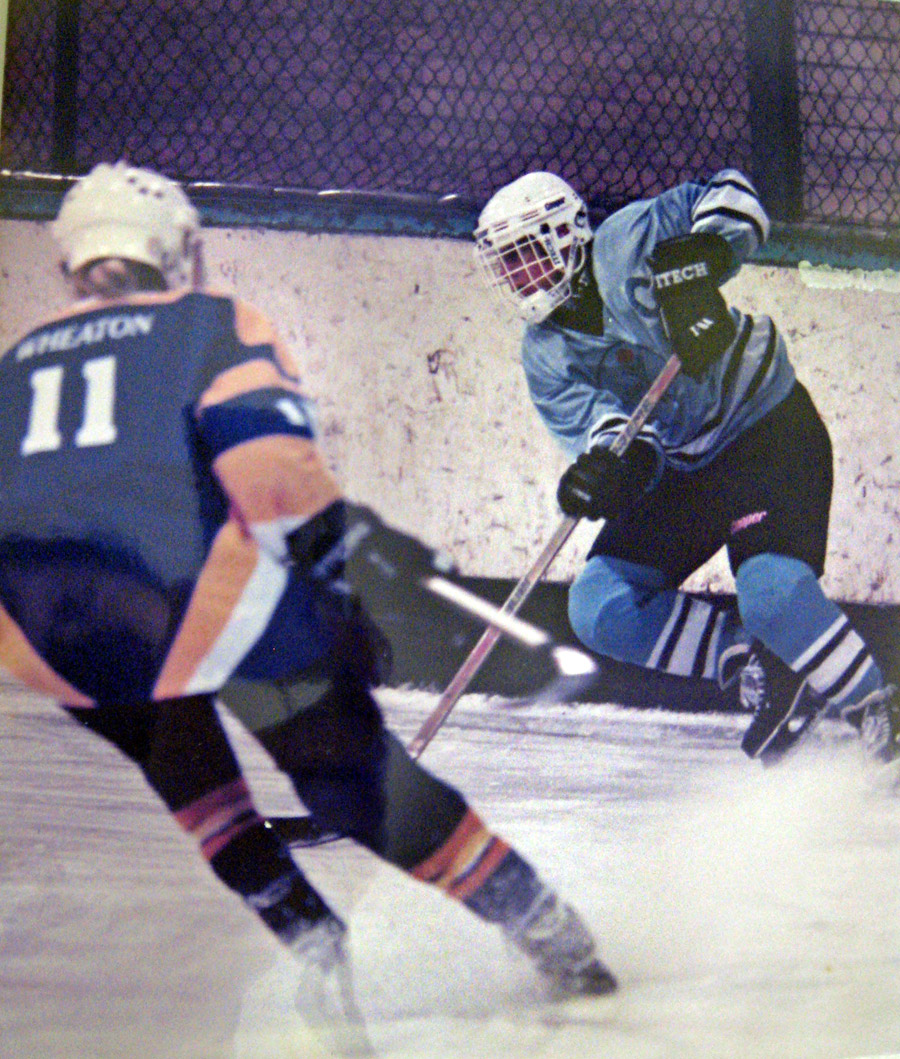 Trailblazing champions: Ovenden versus Steph Wheaton (left), 1999
Trailblazing champions: Ovenden versus Steph Wheaton (left), 1999

Citations
1. Biographical notes and records of Wendy Ovenden, September - October, 2016
2. Bulletin with Newsweek, October 9 1996, vol 116 Issue 6037, p92. "Passing the puck" by Jane-Anne Lee
3. Blacktown Advocate, Sydney, February 12 1992, "Wendy gets put on ice: sidelined over her sex" by John Perry
4. Unidentified Sydney newspaper, 1981, "This team one of a kind"
5. Unidentified Sydney newspaper, "Wendy back on home ice"
6. Unidentified Sydney newspaper, 1996, "Don't miss refs getting own back"
7. The Sydney Morning Herald, Sydney, April 20 1982, "The ice game leaves Karen in the cold"
8. The Sydney Morning Herald, Sydney, February 17 1992, "Sex ruling puts top female hockey player on ice"
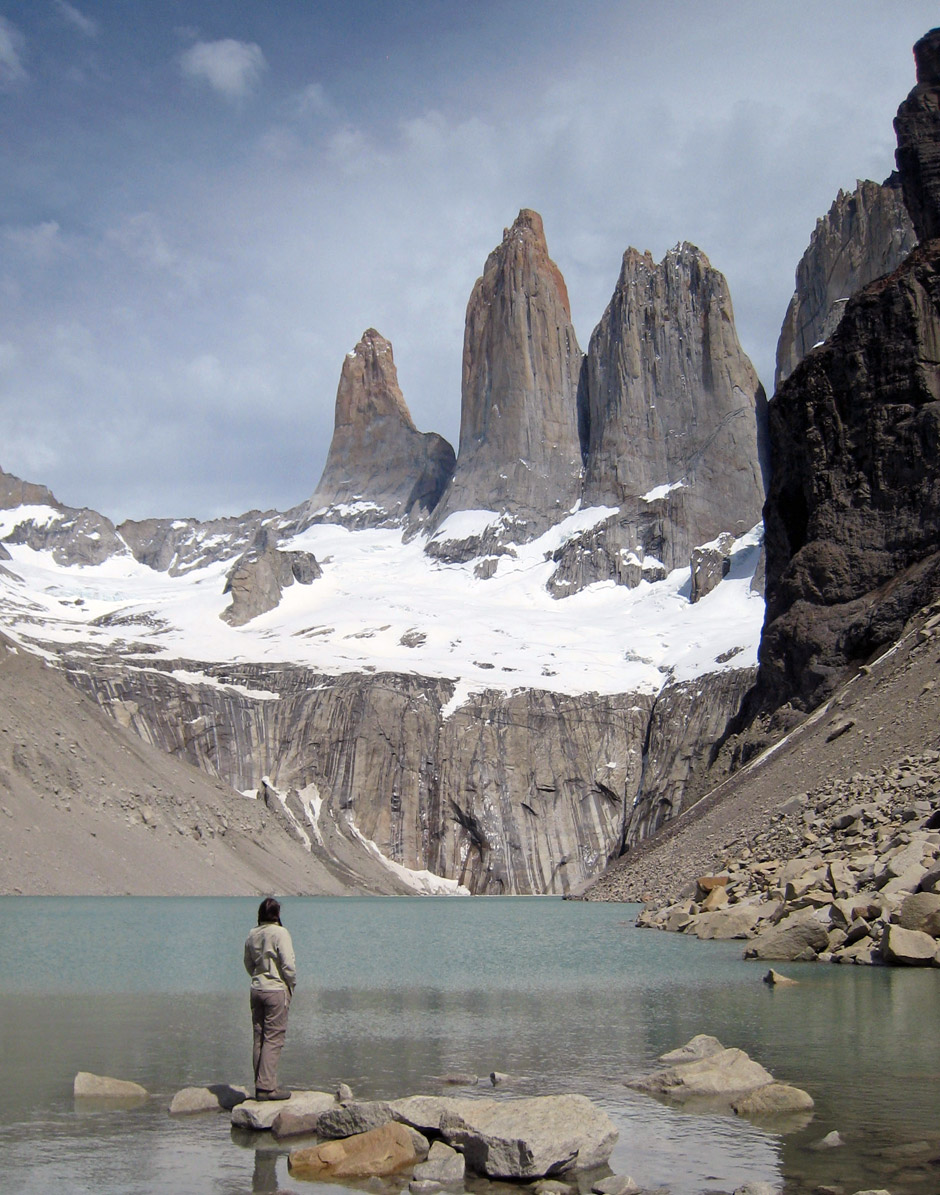
In Patagonia, Torres del Paine in Chile. "Amazing ... climbing up to the base of the towers was breathtaking". Image courtesy Wendy Ovenden.


